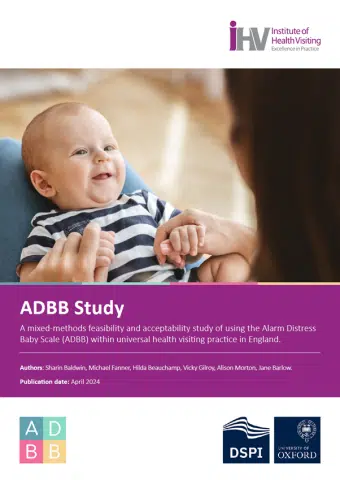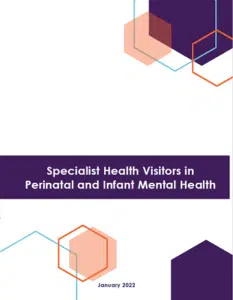Today, the Institute of Health Visiting (iHV) is delighted to share the overwhelmingly positive findings from their mixed-methods feasibility study into the use of the Alarm Distress Baby Scale (ADBB) in routine health visiting practice in England.
The study, commissioned and funded by The Royal Foundation Centre for Early Childhood, was conducted in partnership with Professor Jane Barlow from the University of Oxford. It sought to explore how acceptable and feasible health visitors found using the baby observation aid, the ADBB, and its shorter modified version, the m-ADBB, during their routine 6-8-week visits to families.
During the ten-month study, health visitors trained in the ADBB and m-ADBB were recruited from South Warwickshire NHS Foundation Trust and Humber Teaching NHS Foundation Trust. Quantitative and qualitative data were collected over a four-month period, during which the trained health visitors used their enhanced skills and knowledge to observe babies’ behaviours and interactions and identify those in need of a more thorough assessment or additional support.
Health visitors described the ADBB approach as “hugely beneficial” and “of great importance” to their practice. Findings demonstrate that both training programmes (ADBB and m-ADBB) were rated highly by all study participants, giving a new theoretical perspective, additional knowledge and skills, and a new vocabulary for explaining their observations of a baby’s behaviour. The use of the shorter validated 5-item version of the scale, the m-ADBB, was found to require minimal additional time and was considered easy to embed into routine health visiting practice (for example, the observation could be undertaken when parents were undressing their baby, or the baby was being weighed). Using the m-ADBB in this way enabled health visitors to:
- Have more meaningful conversations with parents and carers about the emotional wellbeing of their baby;
- Promote positive parent-infant interactions, attachment, and bonding; and
- Identify those babies and families in need of greater support during this critical period of development.
Dr Jane Barlow, Professor of Evidence Based Intervention and Policy Evaluation at The University of Oxford, who oversaw the evaluation of the trial said:
“Babies are born with amazing social abilities. They are ready to relate and engage with the world around them, communicating how they feel through their behaviours.
“Whereas previous approaches have focused on the parents’ perspective, this training has really helped health visitors to ‘read’ the baby during interactions and develop greater sensitivity in terms of the observation of potential attachment and bonding issues that would not have been identified without the training.
“The feedback from those involved has been overwhelmingly positive. It is truly exciting to think about the impact this could have on families right across the country as we enter the next phase of this research.”
Alison Morton, CEO of the Institute of Health Visiting, said:
“Babies can’t talk, but there is now good evidence that they can communicate their experiences of the world around them when we tune in to their behaviours. We are therefore delighted by the positive findings from this study which found that the modified ADBB tool was very workable within universal health visiting practice, providing an important new way for health visitors to observe babies interacting with the people around them. There are many reasons why a baby might be distressed or withdrawn. Spotting these problems as early as possible is important as it will enable health visitors to work with families to ensure that they get the right support and babies can thrive.”
During the study period, health visitors identified behavioural concerns in 23 (10%) of babies as a result of using the m-ADBB. Health visitors were then able to work with families to explore the many possible reasons for this and determine the most appropriate next steps. All identified families were offered additional support, ranging from follow-up visits, emotional wellbeing visits and video interaction guidance (VIG) as well as connections to Child and Family Centres and referrals to Specialist Perinatal Mental Health and other local support services where indicated.
Conclusions and next steps
The quality of interactions that a baby has with their parent or caregiver is associated with their long-term development outcomes. Health visitors have a key opportunity in their routine contacts with families to promote optimal parent-infant interactions and identify emerging concerns. However, assessing these interactions can be quite complex, requiring a robust theoretical understanding as well as sound clinical observational skills.
The ADBB training introduced health visitors to the concept of social withdrawal – a coping mechanism that babies may use if they are experiencing some sort of stress in the environment around them. The additional understanding gained from observing babies’ behaviour from this perspective sat very well alongside health visitors’ existing skills. It helped them to consider how babies let us know they are ‘here, and engaging with the world’ and identify where additional support may be needed.
Executive Director of The Centre for Early Childhood, Christian Guy, said:
“The quality of the relationships between babies and their parents or carers, during the first weeks and months of life, shapes their developing brains and lays the foundations for their future health and wellbeing. So, it is vital that we provide families with the best possible advice and support at this crucial time.
“The results of the initial phase of testing are so encouraging. We now want to move quickly to ensure we build on this work, bringing the benefits of this model to more health visitors across the country so that, ultimately, more babies and their families get the support they need to thrive.”
In light of the positive findings of this study, the report includes recommendations for a second phase of research and evaluation of the tool in the UK context. In addition to several suggested research strands, consideration should also be given to:
- a UK-based training programme with amendments to the training to align with the UK context, incorporating the training improvement recommendations from this study
- Evaluation of the impact of training in more health visiting sites across the UK
- Support systems for health visitors if ADBB/m-ADBB are adopted within health visiting practice, to include continuing professional development, supervision, learning resources and practice opportunities
The iHV, in partnership with the University of Oxford, would like to express its sincere thanks to The Royal Foundation Centre for Early Childhood for funding this important study and for their support and oversight throughout the study period.
Training in the ADBB and m-ADBB was kindly provided by Alexandra Deprez and Jocelyne Guillon of Humagogie training centre. Further details can be found at adbb-scale.com.
To cite this report , please use the link to the pdf here: https://bit.ly/4a7z2hT
The research team would like to acknowledge the governance and guidance of the Expert Advisory Group:
- Alison Morton (Chair) – Institute of Health Visiting
- Dr. Sarah McMullen – The Royal Foundation Centre for Early Childhood
- Hannah Sereni – Start for Life Unit
- Wook Hamilton – Parent-Infant Foundation
- Professor Crispin Day – South London and Maudsley NHS Foundation Trust
- Lynne Reed and Wendy Nicholson – Office for Health Improvement and Disparities
- Sarah Muckle – City of Bradford Metropolitan District Council, Director of Public Health
- Professor Carl May – London School of Hygiene & Tropical Medicine
And the dedicated health visitors, managers and research departments at the Humber Teaching NHS Foundation Trust and South Warwickshire University NHS Foundation Trust who participated in the study.
Watch Sky News article: ‘Overwhelmingly’ positive results for trial funded by Princess of Wales as part of early years work




